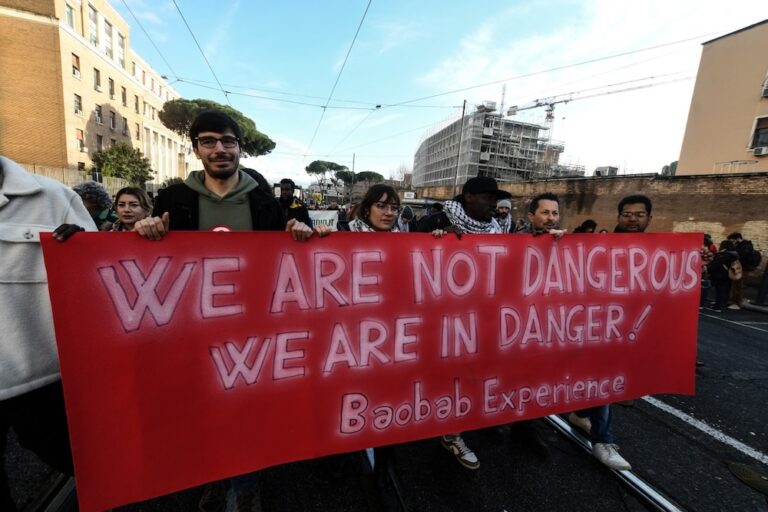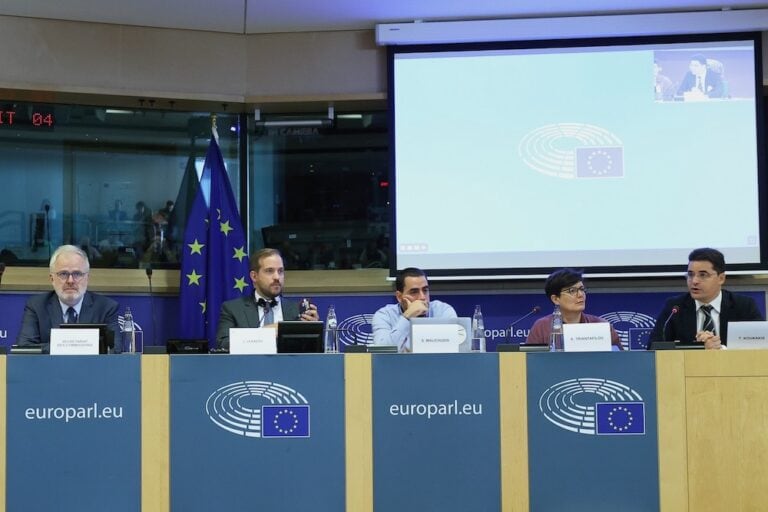(RSF/IFEX) – RSF has urged Italian President Carlo Azeglio Ciampi to veto the Gasparri Law on Television Broadcasting. The law was passed by Parliament on 2 December 2003. The organisation believes it is a threat to press freedom. The law is meant to pave the way for terrestrial digital television, but it also allows companies […]
(RSF/IFEX) – RSF has urged Italian President Carlo Azeglio Ciampi to veto the Gasparri Law on Television Broadcasting. The law was passed by Parliament on 2 December 2003. The organisation believes it is a threat to press freedom.
The law is meant to pave the way for terrestrial digital television, but it also allows companies to have interests in more than one news media category, reforms anti-trust restrictions and changes the composition of the state broadcaster RAI’s board of governors. The president has one month to approve the law, or veto it if he finds it violates constitutional principles.
“This reform, which clearly serves the interests of the Mediaset group owned by Prime Minister Silvio Berlusconi, represents a real danger for the autonomy of public television and a threat to pluralism in news,” RSF Secretary-General Robert Ménard said in a letter to President Ciampi. “We call on you to refuse to endorse this law in the name of press freedom,” Ménard added.
“The simultaneous possession by one person of a news media empire and the highest political office is a unique anomaly in Europe, one that will only be aggravated by the broadcasting law and the proposed law on conflict of interest,” Ménard continued. “The European Union would thereby set a very bad example for countries that have yet to fully respect the principles of press freedom and democracy.”
The new law lifts a ban on any one person owning more than two national broadcast stations. Prime Minister Berlusconi will therefore be able to continue owning his three terrestrial broadcast stations (Italia 1, Canale 5 and Retequattro), although the Constitutional Court had previously insisted that Retequattro become a satellite channel on 1 January 2004, to comply with competition laws.
By lifting the ban on holding interests in more than one news media category, the new law will also allow those who own television stations to acquire newspapers and vice versa, although in practice, the print media are too strapped for cash to take advantage of this provision. Beginning in January 2009, however, an individual who owns more than one television station will be able to make print media acquisitions. In fact, Berlusconi already owns Mondadori, one of Italy’s biggest print media and publishing groups.
In its reform of antitrust limits, the new law says that no person will be allowed to own more than 20 per cent of global advertising revenues, but global income is redefined to include not only television spots but also advertising in the print media, cinema and publishing. Mediaset and the state broadcaster RAI together currently take in 93 per cent of television advertising revenues, with Mediaset alone taking in 63 per cent.
Finally, the law also provides for the progressive privatisation of RAI and a change in the composition of its board of governors. RAI’s privatisation is to begin before the end of January 2004, but no one will be able to own more than one per cent of the shares, which will leave the Economy Ministry in control.
Instead of having five members named by the presidents of the senate and chamber of deputies, RAI’s board of governors will have nine members – seven of them named by the Parliamentary Monitoring Commission and two by the Economy Ministry. Lucia Annunziata, chairperson of RAI’s board of governors, has said she will resign as soon as the law is approved by President Ciampi.
The proposed conflict of interest law, which is still awaiting the Senate’s approval, stipulates that the management of a profit-making enterprise is incompatible with public office, but insists that there is no conflict of interest if the running of the company is entrusted to another person. Since Prime Minister Berlusconi’s companies are run by family members and associates and Berlusconi’s name does not appear in their organisational charts, there would be no conflict of interest in his case under the proposed law.
In a report entitled “A media conflict of interest: anomaly in Italy,” published in April 2003, RSF analysed the consequences of Berlusconi’s conflict of interest on the diversity of news in Italy, which fell to 53rd position in the RSF international press freedom ranking in 2003.
The full report is available in English, French and Spanish at http://www.rsf.org


